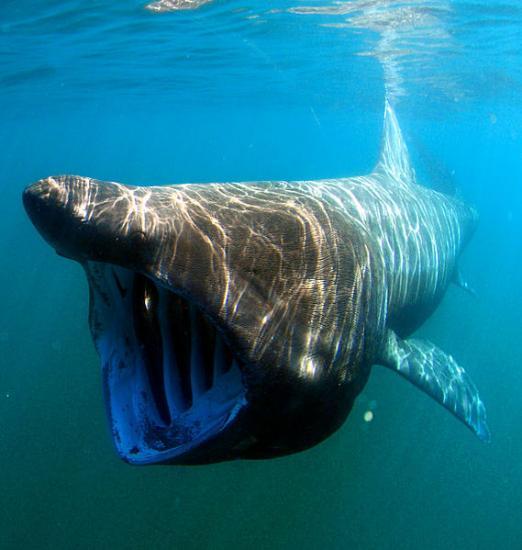Second year of basking shark tagging gets underway
17th July 2013

The second year of a project to track basking sharks in Scottish waters gets underway today (Thursday 18 July 2013).
Scientists from Scottish Natural Heritage (SNH) and the University of Exeter are heading out to the Inner Hebrides to tag another 27 of the giant sharks with satellite tracking tags. The tags, which let the public follow the movements of a number of the sharks online, will collect data that will give the team an insight into their behaviour during the summer months.
The work is part of a wider programme of marine research led by SNH and Marine Scotland, to help Government and others plan for the sustainable management of the sea. Results from the tagging project will help the Scottish Government decide whether a Marine Protected Area should be put in place to safeguard the sharks and help balance environmental interests with industry and recreation.
The tagging project, which began last July, was set up to find out more about the life cycle of the large numbers of sharks that gather around the islands of Coll, Tiree and Canna every summer.
Some of the 20 sharks tagged last year stayed in the area between 5 and 57 days before the tags detached, the sharks moved deeper or they swam south. Depth data collected so far has shown that sharks mainly occupy the top 250m of the water column, although two sharks were recorded down at 1000m, off the edge of the continental shelf.
Dr Suzanne Henderson from SNH, who is managing the project, said: �It�s great to be working with Matthew Witt and his team from the University of Exeter again on this fascinating project. The second year of tagging will build on last year�s work, helping provide insights into shark behaviour year on year and identify any trends in the behaviour of sharks in this area. We�re tagging more sharks this year to increase the confidence we have in the results and so we can look more closely at how behaviour differs among individuals.
�We hope the public will enjoy taking part again by following the progress of 15 of the sharks online. Last year half of the tags stayed on the sharks for over 90 days, with one detaching from its shark (Elgol) after 326 days to the south west of Portugal! We hope this year is just as successful.�
Dr Matthew Witt from the University of Exeter added: �Working with SNH is an exciting opportunity - it allows us to unite our unique capabilities to help improve knowledge on the life history of basking sharks, with the long term aim of delivering a sustainable future in our increasingly busy coastal seas.�
SNH and UoE are asking anyone who finds a tag around the shores of the UK to get in touch. The tags are silver/grey, torpedo or oval shaped, 15 to 18 cm in length with a small antenna and may still have a plastic tether attached. If found please pick up and contact the SNH office in Oban on 0300 244 9360, or email baskingsharks[AT]snh.gov.uk There is a reward available for each tag returned.
To track the basking sharks online after they are tagged, go to http://www.snh.gov.uk/about-scotlands-nature/species/fish/sea-fish/shark-tagging-project/
Basking sharks can grow up to 11m in length (the length of a double decker bus) and 7 tonnes in weight but they feed entirely on plankton, tiny animals that drift through the water. The plankton are caught in their enormous gaping mouth while the water is filtered out by their comb-like gills. They are long lived, with some surviving as long as 50 years. Because they are slow moving, slow to mature and long lived, they are very vulnerable to human disturbance and impacts. For generations they were hunted for the high oil content of their large livers. More recently they were hunted in European waters for their colossal fins.
Basking sharks are most often seen in coastal areas in the summer and autumn when plankton are abundant at the surface and this is how they get their name � from apparently �basking� at the surface in calm, sunny weather.
Basking sharks in the North East Atlantic are recognised by the International Union for the Conservation of Nature (IUCN) as �endangered�. Trade in their body parts is restricted by the Convention on the International Trade for Endangered Species (CITES). In the UK they are protected by the Wildlife & Countryside Act (1981), as amended.
Marine Protected Areas
To meet international commitments, Scotland is required to create a network of Marine Protected Areas (MPAs) in Scottish waters, under the Marine (Scotland) Act and the UK Marine and Coastal Access Act. The process is led by Marine Scotland. SNH�s role is to provide information and advice about the marine environment in territorial waters to Marine Scotland and Ministers so they can decide where MPAs should be. The project also includes JNCC, Historic Scotland, Marine Scotland Science and the Scottish Environment Protection Agency.
For the latest information see news release at http://www.snh.gov.uk/news-and-events/press-releases/press-release-details/?id=809
Basking sharks are one of a number of important species and habitats on the list of Priority Marine Features (PMFs), developed to help target conservation work in Scottish waters. A related list of MPA search features includes basking sharks, and is helping to drive the selection of nature conservation MPAs.
More information about the Scottish MPA process is available from:
Marine Scotland: www.scotland.gov.uk/Topics/marine/marine-environment/mpanetwork
SNH: www.snh.gov.uk/marine-protected-areas/
PHOTO
Basking shark (Cetorhinus maximus)
Photographer Greg Skomal - Public domain via Wikipedia www.wikipedia.org



